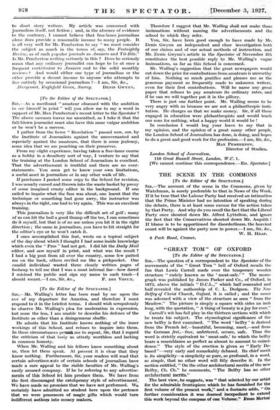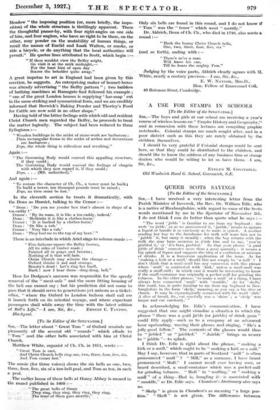"GREAT TOM" OF OXFORD
[To the Editor of SPECTATOR.] Sra,—The question of a correspondent to the Spectator of the movements of the " Great Tom " bell of Oxford recalls the fun that Lewis Carroll made over the temporary wooden structure " rudely known as the ' meat-safe.' " The mono- graph was published by James Parker and Co., of Oxford, in 1872, above the initials " D.C.L.," which half concealed and half revealed the authorship of C. L. Dodgson. The New Belfry of Christ Church, Oxford, it is called ; and the cover was adorned with a view of the structure as seen " from the Meadow." The picture is simply a square with sides an inch long, with the quotation, " A thing of beauty is a joy for ever."
Carroll's wit has full play in the thirteen sections with which he treats his subject. The etymological significance of the new belfry is first examined. " The word ' belfry ' is derived from the French be/,—beautiful, becoming, meet,—and from the German frei,—free, unfettered, secure, safe. Thus the word is strictly equivalent to ' meat-safe,' to which the belfry bears a resemblance so perfect as almost to amount to coinci- dence." The style of the erection is given as " Early De- based "—very early and remarkably debased. Its chief merit is its simplicity—a simplicity so pure, so profound, in a word, so simple, that no other word will fitly describe it. In the section entitled, " On the other architectural merits of the new Belfry, Ch. Ch." he comments, " The Belfry has no other architectural merits."
The best view, he suggests, was " that selected by our artist for the admirable frontispiece which he has furnished for the first volume of the present work," and a footnote adds, On further consideration it was deemed inexpedient to extend this work beyond the compass of one Volume." From Merton Meadow " the imposing position (or, more briefly, the impo- sition) of the whole structure is thrillingly apparent. There the thoughtful passer-by, with four right-angles on one side of him, and four anglers, who have no-tight to be there, on the other, may ponder on the mutability of human things, or recall the names of Euclid and Isaak Walton, or smoke, or ride a bicycle, or do anything that the local authorities will permit." He quotes lines attributed to Scott, which begin :— " If thou wouldst view the Belfry aright, Go visit it at the mirk midnight,— For the least hint of open day Scares the beholder quite away."
A great impetus to art in England had been given by this erection, he suggests. An enterprising maker of bonnet-boxes was already advertising " the Belfry pattern " ; two builders of bathing machines at Ramsgate-had followed his example ; " one of the great London houses is supplying ' bar-soap ' cut in the same striking and symmetrical form, and we are credibly informed that Borwick's Baking Powder and Thorley's Food for Cattle are now sold in no other shape."
Having told of the bitter feelings with which old and resident Christ Church men regarded the Belfry, he proceeds to treat the matter logically. The subject had been reduced to three Syllogisms :- "Wooden buildings in the midst of stone-work are barbarous ;
. Plain rectangular forms in the midst of arches and decorations are barbarous ;
Ergo, the whole thing is ridiculous and revolting."
Again :- " The Governing Body would conceal this appalling structure, if they could ;
The Governing Body would conceal the feelings of chagrin with which they now regard it, if they could ; Ergo, . . . (MS. unfinished)."
And again :- " To restore the character of Ch. Ch., a tower must be built ; To 'build a tower, ten thousand pounds must be raised ; Ergo, no time must be lost."
In the eleventh section he treats it dramatically, with
the Dean as Hamlet, talking to the Censor :-
"Dean: Do you see yonder box that's almost in shape of a
tea-caddy ? ' Censor : By its mass, it is like a tea-caddy, indeed.'
Dean : Methinks it is like a clothes-horse.'
'Censor : It is backed by a clothes-horse.'
Dean : Or like a tub.'
Censor : Very like a tub.' Dean : They fool me to the top of my bent.' "
There is an interlude in which Arid sings to solemn music :- "Five fathoms square the Belfry frown:.,
All its sides of timber made ; Painted all in grays and browns ; Nothing of it that will fade.
Christ Church may admire the change—
Oxford thinks it sad and strange.
Beauty's dead ! Let's ring her knell, Hark !. now I hear them—ding-dong, bell."
How far Dodgson's sarcasm was responsible for the speedy removal of the " meat-safe " and the more fitting housing of the bell one cannot say ; but his prediction did not come to pass that it should serve to generations yet unborn as a ticket- office, " where the Oxford to London balloon shall call ere it launch forth on its celestial voyage, and where expectant passengers shall while away the time with the latest edition of Bell's Life."—I am, Sir, &c., ERNEST C. TANTON.
Blackpool.











































































 Previous page
Previous page